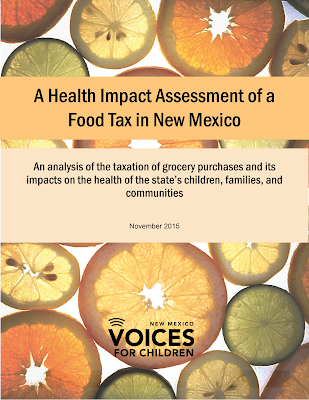Reinstating a tax on the sale of food for consumption at home could harm the health of New Mexicans who are already food insecure—meaning they don’t always have enough to eat. And while the revenue generated from a tax on food could be used to mitigate some of the damage the tax would do, the report finds that it is unlikely governments would spend the new revenue toward that end. -New Mexico Voices for Children's report“A Health Impact Assessment of a Food Tax in New MexicoThere are many efforts underway to examine the relationship of health and nutrition to hunger. This week, the Bread for the World Institute published a comprehensive report on this issue, entitled The Nourishing Effect. On Tuesday, we posted a piece about this report earlier this week.
The New Mexico Voices for Children also published a report on the same topic this week. The report, funded in part by the Robert Wood Johnson Foundation and the Pew Charitable Trusts, is more specific to New Mexico. This report examines how proposals to reinstate a tax on the sale of food for consumption at home could harm the health of New Mexicans who are already food insecure.
“When all is said and done, taxing food will hurt those New Mexicans who are already hurting the most,” said Veronica C. García, Ed.D., executive director of NM Voices. “Almost a third of our state’s children don’t get enough to eat—even with school meals, SNAP benefits and food banks. How can we, in good conscience, expect them to do with even less food?"
The report looks at three possible outcomes of a food tax: that families would maintain their current food purchasing patterns, leaving less money for other necessities such as medication and health care; that families would spend the same amount of money on food, but be able to purchase less of it (or substitute less-expensive, less-nutritious foods); and that state or local governments would collect more revenue, which could impact their spending patterns.
Health Impacts of a Food Tax on Family Economic Security: Taxing food would cost each New Mexico household around $350 per year, or $29 per month, on average. Highest-income earners in New Mexico would spend about one-half of 1 percent of their income on a food tax, while the lower half of New Mexico earners would spend around 1 percent of their income on the food tax alone—double the rate that high earners would pay. Research and calculations show that a food tax would exacerbate the tax system’s regressivity—that is it would hit low-income earners harder than it would hit high- income earners—and could harm family economic security, which could have negative impacts on mental health and stress levels, income available for other necessary purchases besides food, need and demand for public assistance, childhood development, ability to pay for health services and medicine, economic equity, and the ability to manage chronic conditions through diet.
Health Impacts of a Food Tax on Food Security, Diet, and Nutrition: Taxing food could also have an adverse impact on food security, diet, and nutrition by prompting purchases of less food or cheaper, less nutritious food. This could have important and harmful implications for health, particularly nutrition-related chronic conditions, the ability to manage chronic conditions through diet, childhood development and learning capacity, malnutrition issues, the incidence of low birth-weight and/or preterm babies, and the need and demand for food assistance from public, private, and nonprofit sources.
Health Impacts of a Food Tax on Government Spending: It is also possible that the negative health impacts of taxing food could be mitigated by how that revenue is spent. If food tax revenues lead to overall increased government spending on direct health services, food assistance and nutrition programs, programs that provide recreational opportunities, and education, then the food tax could have positive implications for health, or at the very least have no net negative implications. However, it is more likely that food tax revenue would be used to make up for decreasing revenue and so be used to maintain current service levels. Though it is possible that any increases could be spent on the programs noted above, for most program areas, it is unlikely, particularly at the municipal level.
Here are links to the executive summary and the full report


No comments:
Post a Comment